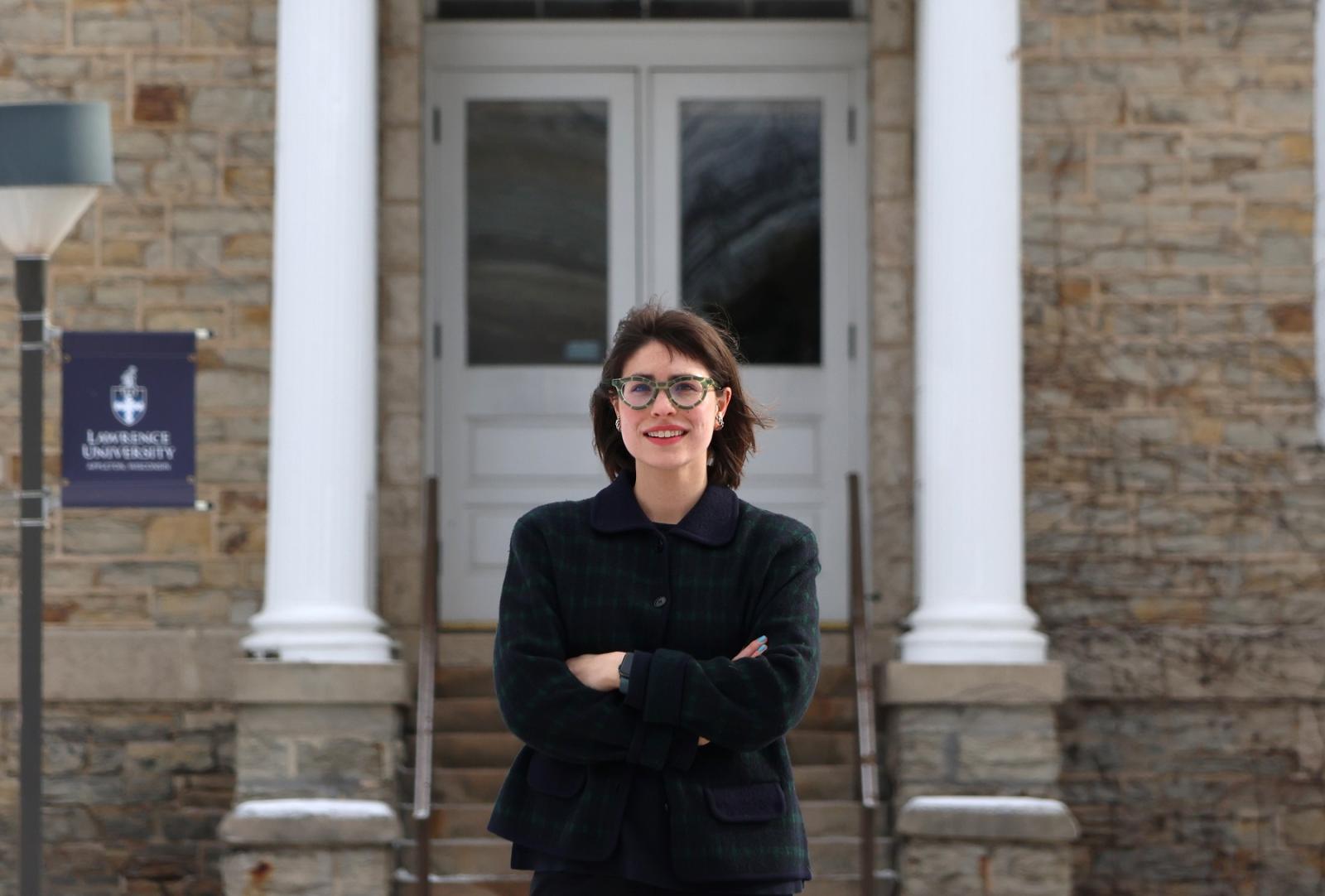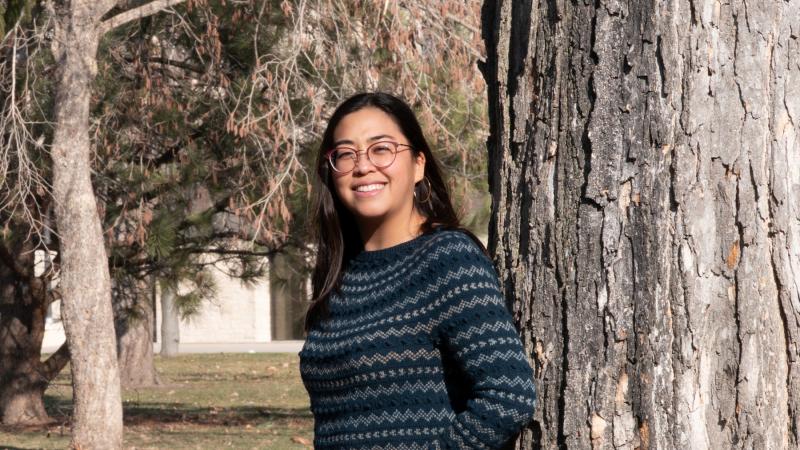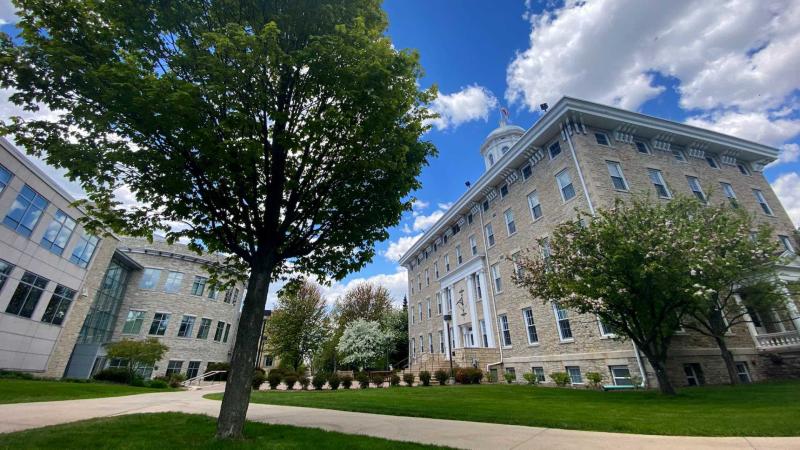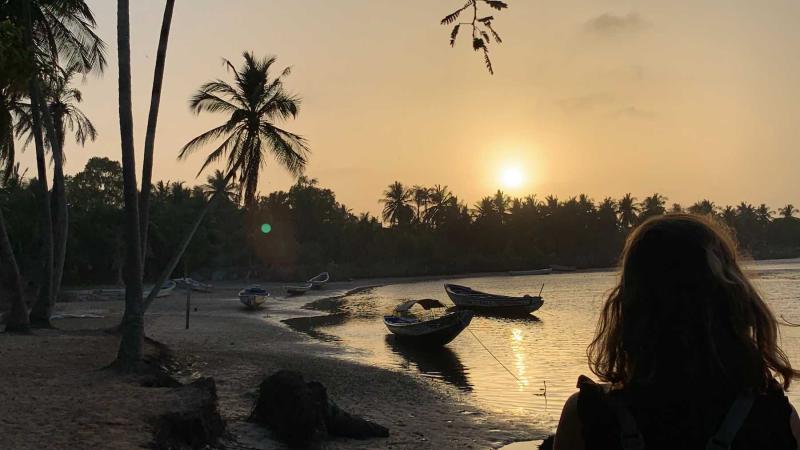About the series: On Main Hall Green With … is an opportunity to connect with faculty on things in and out of the classroom. We’re featuring a different Lawrence faculty member each time — same questions, different answers.
---
Anne Ratnoff, the newest member of Lawrence University’s talented French and Francophone studies faculty, is quickly putting her mark on the curriculum.
A specialist in 20th- and 21st-century French and Francophone literature, Ratnoff has introduced several new courses since joining the faculty in fall 2024, among them, Is It Utopia? Feminist Francophone Fictions and Nature and the New Novel. The former explores how contemporary French and Francophone feminist writers use fiction to sharpen utopic visions for the future—and the present. The latter, taught in French, looks at the settings of novels, focusing attention on the background and environment.
Explore how language opens the door to a world of cultural competencies, intellectual ideas, history, literature, and culture.
Ratnoff also taught First-Year Studies in the fall and is teaching in the Gender Studies program. Her research interests have focused on questions of identity, feminist writing, and narrative theory.
She came to Lawrence after a year as a visiting assistant professor of French at Kenyon College. She holds a Ph.D. in French from Harvard University. She earned a master’s degree in French from Middlebury College in Paris and a bachelor’s degree with a double major in French and cognitive and linguistic sciences from Wellesley College.
We caught up with Ratnoff to talk about interests in and out of the classroom.
In the classroom
Inside info: What’s one thing you want every student coming into your classes to know about you?
I say this at the start of each term, but I really view our class discussions as a long, ongoing conversation. A good conversation is never one-sided, mixes humor with seriousness, and sometimes goes off on a tangent. Conversations require generous listening, which means engaging sincerely with other people and remembering that we all share the goal of communicating something. Thinking about the work we do together with this framework seems to me to support many of the harder aspects of learning: admitting that we don’t know everything already, making the mistakes that force us to grow, situating our knowledge within the bigger picture of the world beyond ourselves.
Getting energized: What work have you done or will you be doing at Lawrence that gets you the most excited?
I recently experienced Björklunden for the first time during the annual Language Immersion Weekend in January, and I can’t believe how lucky we are to have this Door County campus. In Spring 2026, I’ll teach a class called Nature and the New Novel (FREN 425). This course includes a number of guided and independent local fieldtrips to help us concentrate on depictions of the background and the environment in experimental novels. And I’m working to make Björklunden one of the sites of our fieldtrips.
Going places: Is there an example of somewhere your career has taken you (either a physical space or something more intellectual, emotional, or spiritual) that took you by surprise?
First, a confession: I love mysteries. And while I currently can’t stop listening to Agatha Christie audiobooks, which have very satisfying resolutions, I am even more excited to read a book where the mystery can’t be solved. This was the origin of FREN/GEST 475: Is It Utopia? Feminist Francophone Fictions (offered alternately in French and in translation). Each novel we read in this class involves mystery and murder(s), but the murder is not the mystery. Instead, it’s the protagonist who resists identification. As the story unfolds, the reader gets caught in a web of suspense, which is both frustrating and exhilarating. The ultimate focus of this course—the no-place of utopia—came out of discussions with students, who picked up on this keyword in the course description and ran with it. One of the things I love most about teaching is being surprised by what captures the attention of each group of students—it is always something new and different, which makes the mysterious texts we read together feel thrilling each and every time.
Out of the classroom
This or that: If you weren’t teaching for a living, what would you be doing?
When I was little, I wanted to be a paleontologist—Atlanta’s Fernbank Museum of Natural History made a big impression on me as a 3-year-old. But in this hypothetical world where I am not teaching or writing, I think I would like to make things with my hands. I recently started dabbling in ceramics, which has been strongly encouraged by my friend Meghan Sullivan (assistant professor of ceramics and expanded media). There is something incredibly therapeutic about building something out of clay: your mind stays focused on the task literally at hand, and you have to let go of the idea of making something “perfect.” There’s an obvious and tangible transformation from the beginning to the end. The process is unpredictable, and sometimes mistakes you made (like when you didn’t thin out the glaze properly…) turn into happy, beautiful accidents. I have to say, this description also maps onto how I feel about my scholarly writing and creative side projects. So, I guess I’m saying, if I weren’t doing what I am doing now, I would still seek out ways to channel my creativity and to constantly keep learning.
Right at home: Whether for work, relaxation or reflection, what’s your favorite spot on campus?
I really like the John G. Strange Commons on the first floor of Main Hall. It’s a quiet and serene counterpoint to the foot traffic between classes and has lovely natural light for reading.
One book, one recording, one film: Name one of each that speaks to your soul? Or you would recommend to a friend? Or both?
Book: The Villain’s Dance, Fiston Mwanza Mujila, translated from the French by Roland Glasser (2020/2024). This was a 2024 finalist for the National Book Award for translation, and it follows a dizzying cast of characters from 1990s Zaire (present-day Democratic Republic of the Congo) into the diamond mines of Angola. It’s raucous, it’s a labyrinth, and I couldn’t put it down.
Recording: Erykah Badu, “Window Seat” on New Amerykah Part 2. I’ve had this song on repeat since high school.
Film: India Song, Marguerite Duras (1975). This film made such an impression on me as an undergrad. My professor told us that every time she went back to Paris, she would go see this film at the same tiny cinema every Friday at noon. The story is sentimental and lyrical, strange and haunting. The visuals are stunning.
Find more faculty profiles in the On Main Hall Green With ... series here




